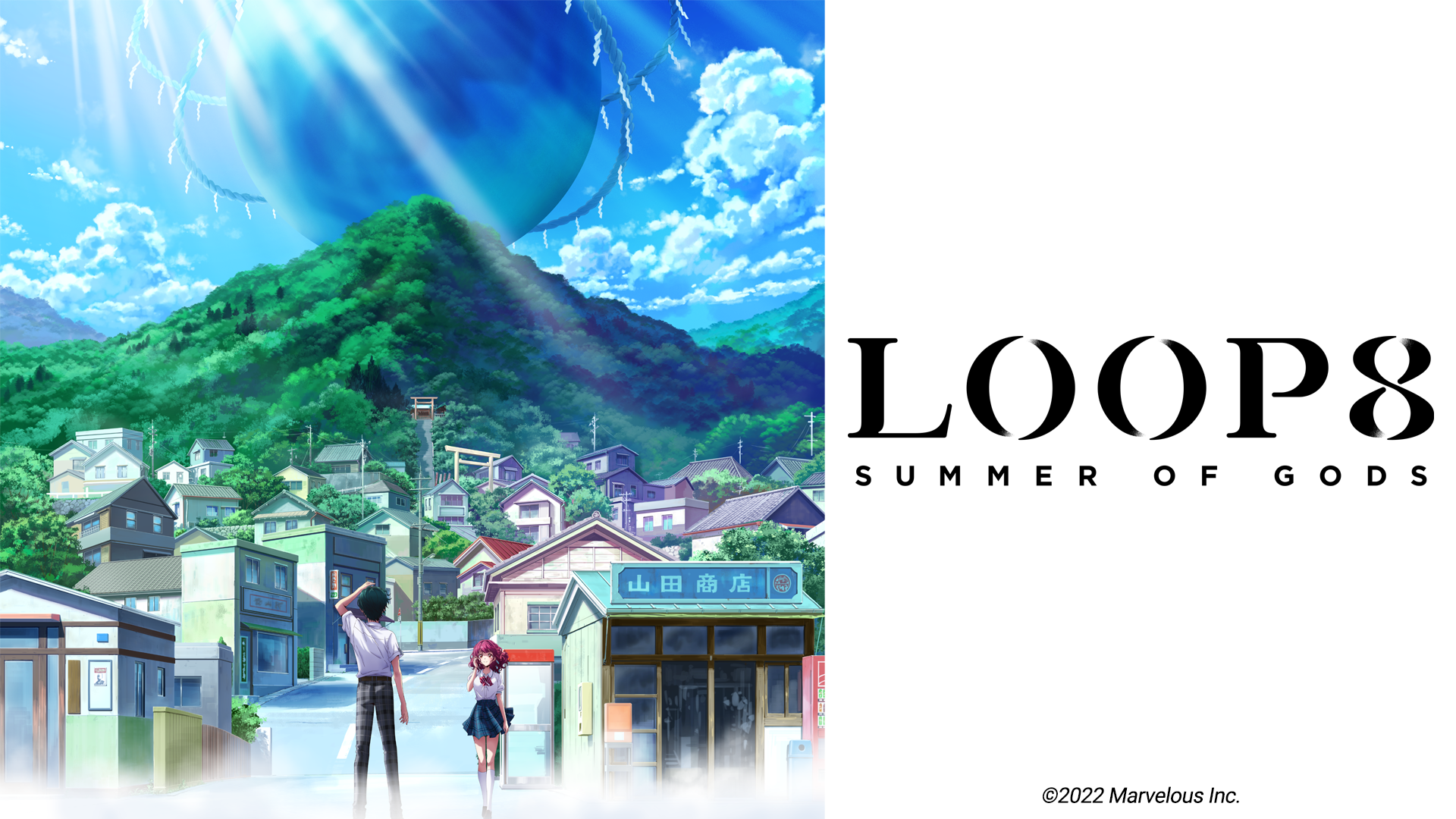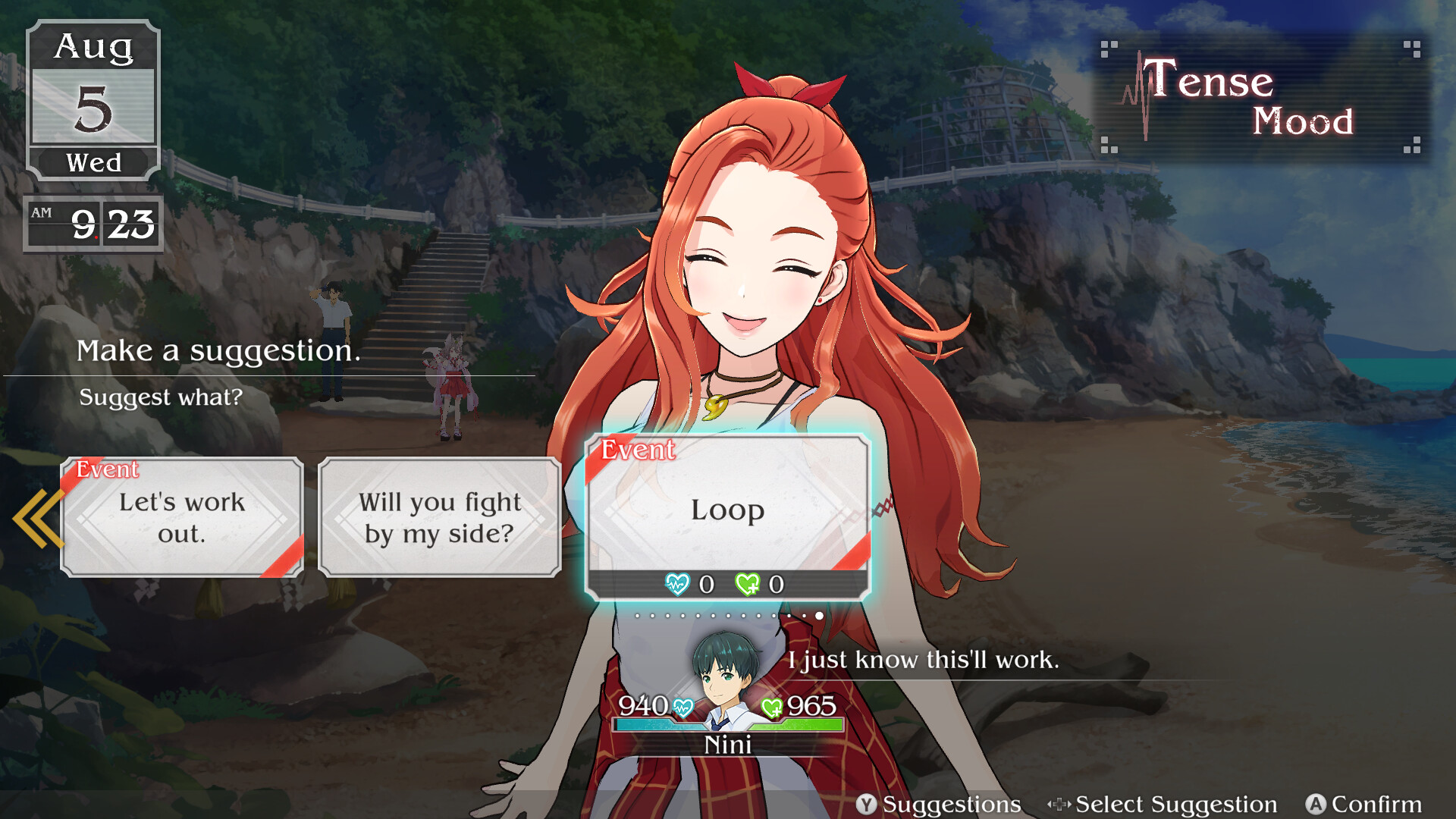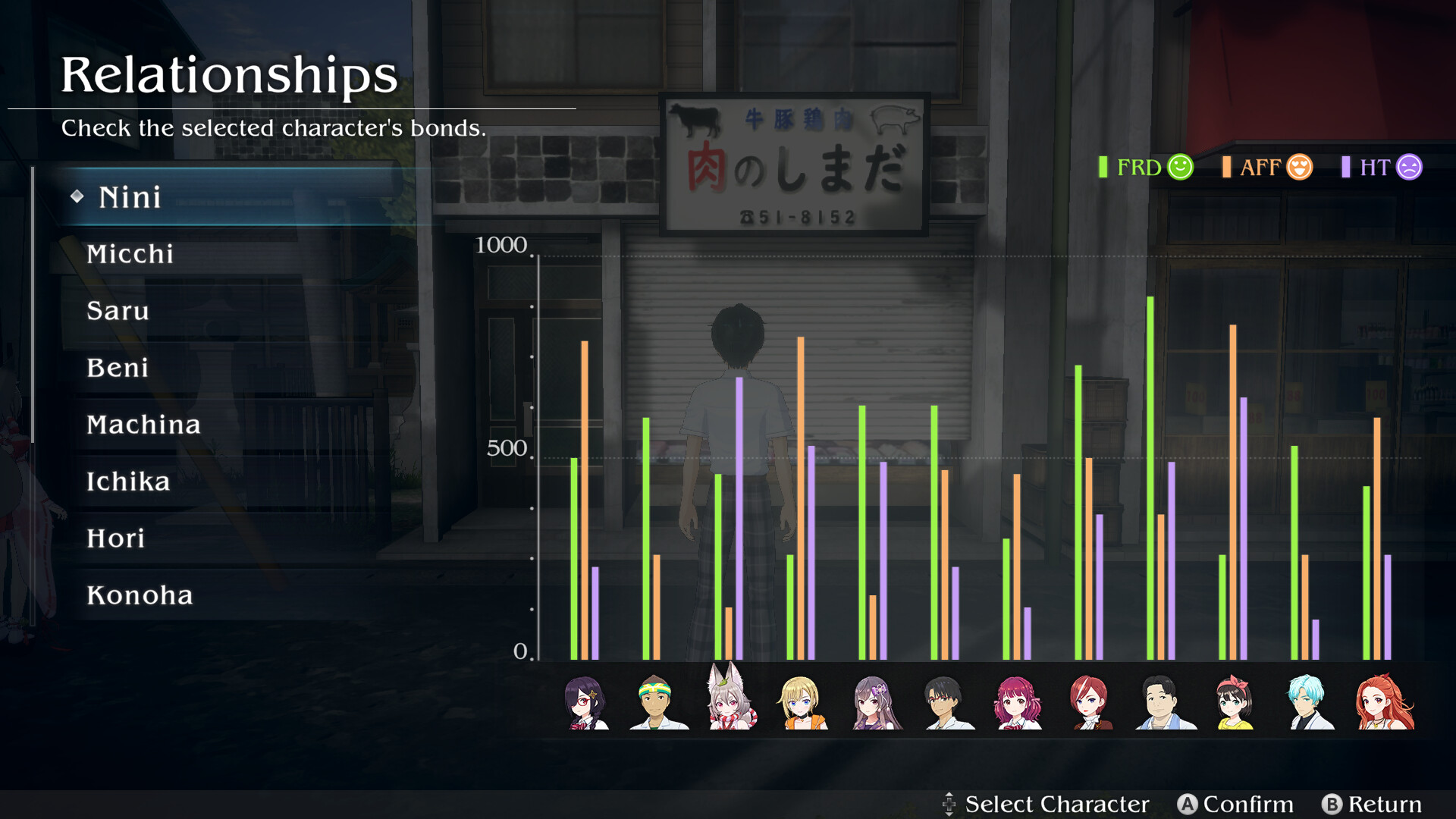
When we first met with XSeed/Marvelous at PAX East 2023, we were not quite sure what to expect. Before taking the meeting, I only knew of four XSeed games No More Heroes, Bullet Witch, Killer is Dead, and The Legend of Heroes: Trails of Cold Steel. With more of an action focus, Trinity Trigger was the first game to catch my eye due to a past love for Golden Sun. Agreeing to meet with XSeed/Marvelous, we previewed Loop 8: Summer of Gods, Trinity Trigger, Story of Seasons: A Wonderful Life, and AKIBA’S TRIP: Undead & Undressed Director’s Cut.
During our time with Loop 8: Summer of Gods, our demo was cut short; however, we did get to try out a fight. Because of this, we practically went into Loop 8: Summer of Gods blind but that was not going to stop us. After just a taste of the game, we knew that there was a lot more below the surface and we just had to find out. If you are reading this, you are also curious about Loop 8, so let’s dive into our actual review.
Loop 8: Summer of Gods
Developer: Marvelous Inc/Sieg Games
Publisher: XSEED Games, Marvelous INC
Platforms: Windows PC (Steam), Xbox One, Switch, and PS4. Available on Xbox Series X|S and PS5.
Release Date: June 1st, 2023 JP, June 6th, 2023 USA and Europe
Players: 1-10
Price: $49.99 USD
Story
Prior to starting Loop 8: Summer of Gods, we had very little information about the overarching story. Going in all we knew was that our character, Nini, had come down from the space station to Ashihara; the game is set in 1983 and reflects that. Despite taking place four decades ago, the game’s story does not feel dated, and the characters within are relatable. In fact, it feels like a much more relaxing and simpler time outside of the Kegai attacks. Whenever a Kegai attacks, they possess one of the people within town and manipulate them using the negative emotions within their hearts.
Discovering who is possessed is not always an easy task. As you proceed through your day, you will need to interact with everyone to discover who has been possessed. Once you uncover who has been possessed, a cutscene will play showing their negative feeling as they are dragged to the underworld. It is up to you to save the world and potentially the innocent person that is being possessed by the Kegai.
Early in the game, it is very easy to lose track of time or focus on the wrong things. If you run out of time, the Kegai will destroy the world and send you back to day one. This loop reset allows you to learn new things, build stronger bonds, train skills, and potentially save someone from dying. When trying to save the person who is possessed and the world, you will need to travel to the underworld. When going to the underworld, players can bring up to two allies to fight the Kegai, so the player will need to choose a team of helpful allies.
Unlike other JRPGs, when a teammate faints in battle the ally dies and is gone for the rest of the loop. Depending on how the battle in the underworld plays out, the characters in town will realize that one of their town’s members will have died and have negative feelings about it. Every action the player makes helps determine the game’s final narrative, whether it is the allies still alive, the bonds formed, or how the world ends.
Story Verdict
For a narrative, Loop 8: Summer of Gods gives players something that is rarely seen in video games; players can expect a multilayered story with depth and emotion, but getting to the ending they truly desire might take some time. In fact, during our playthrough, it took us three loops to get to the final boss and even then we were not satisfied with the ending we got.

Gameplay
Overworld, Leveling, and Building Bonds
When playing through Loop 8: Summer of Gods there is a lot to learn and the game does not take it easy on you; because of this expect to loop a few times. Throughout the game, the player will need to manage how they spend their day. A typical day runs from early AM (5/6) to 3 AM the next day. During each day, the player must manage their energy and stamina.
Engaging with other characters can utilize stamina, energy, or both; if a player drops to zero they will have to rest. Remember it is important to eat during the day; eating during the day will recover some or all of the player’s stamina and energy. If you have brought an ally with you to eat, their energy and stamina will also recharge.
Unlike other JRPGs, the game does not use a level system; instead, the game uses three relationship statuses to determine how much health each character has and how much damage they will deal. Throughout the day, the player can choose to either interact with characters or build up their own personal stats. Interacting with the character can get a different response based on the game’s personality engine called The Corral System.
The Corral system will guide how a character responds to the player’s interaction and dictate their response. Based on their response, it will either raise the character’s affinity for affection, friendship, or hatred. The main character’s skill stats will determine how each character’s bond will form with the main player or allies. As you interact with each character, certain interactions will become less likely to succeed; if an interaction fails, the character’s hate towards the player will grow.
Interacting with characters can also earn the player blessings as they get to know more about each character. Blessings grant stat boosts to each character and carry over each loop. Blessings can also be found at each area’s shrine. These blessings can be used either to boost the player’s stats or an accompanying ally’s stats. The player can also boost their stats by taking time out of their day to enhance a certain skill; each enhancement takes 90 mins out of the player’s day and some can only be used at a certain time. Having skills higher up makes new story options open up and can give each character new abilities.
These skills and relationships will help determine whether or not you will be successful in freeing your neighbors from Kegai’s possessions and surviving the underworld.

The Underworld, Kegai, and Death
Each time a character gets possessed, you have three days to deal with them and save the world. Ultimately, how you decide to deal with it is your choice. Will you save your peer or slay them to save the world? Saving each character is no easy task though, you will need a strong bond with them in order to save them. At the end of the fight, if your friendship is high enough with them you will be able to save their life; otherwise, if you fail to do so they will disappear from existence at least until the next loop starts.
Each loop is not the same and a character that was possessed in the previous loop might not get possessed at all in the next loop. You will reach the final boss if you make it to August 31st and discover who is the last person possessed by a Kegai. In order to take down a Kegai, you will need to travel to the underworld and collect magatama. While in the underworld, the player can also gather blessings to improve their character’s stats or the stats of their allies. These stat boosts can potentially mean life or death for an ally.
If an ally is close to death, you can leave the underworld as long as you have a day left until annihilation. After breaking the barrier with the magatama, the team’s health and energy will be restored. Going into each Kegai fight, each character’s relationship with the possessed will determine how much damage they do but also the boss’s disposition.

During combat, you are responsible only for your actions. At the start of each round, you can use your celestial site to see what your allies and the enemy will potentially do. This gives the player a chance to either attack, defend their ally or heal themselves. Each party has their own unique abilities but you can never be quite certain what they will do until they do it.
In combat, the player can attack the Kegai with three emotionally charged attacks. The three emotional bonds that you have formed with the character and the party will determine how much damage will be dealt based on the emotion chosen. Hate attacks can deal more damage but also allows the boss to dish out more damage and unique status effects. Affection attacks can lower the boss’s damage overall. Friendship attacks look to just reach the possessed.
A good trick once the Kegai has broken free is to create a save. Once you have figured out who has been possessed, loading up that save and working on strengthening the bond between that character and your party members will lead to the best success rate. If you would play the game truly as intended expect to do multiple loops.
Gameplay Verdict
When it comes to Loop 8: Summer of Gods gameplay, the game gives you an idea of what you need to do in order to save the town, but it leaves a good bit for the player to discover. The inability to control your allies’ abilities during fights can lead to devastating consequences and frustrations. Time management is ultimately the key factor of the game. Will you increase your own stats or build up each character’s relationship? Knowing that relationships don’t carry over each loop can be a deterrent, but will determine if you succeed in the fight. So you will need to find balance and have proper time management.

Graphics/Audio SFX/Controls
Loop 8: Summer of Gods has both positive and negative aspects. In the main world, the interactions that you have with each character are in a 2D style but still show off the details of each character. The world around is decently detailed enough that you can understand what it is supposed to be. When moving through bigger areas, the character’s running looks a bit awkward; this is especially true when in the underworld. In combat, the game has frame rate issues where attacks lag, it almost looks like your brain is trying to process what you are seeing.
With Loop 8: Summer of Gods controls, the player can choose to use either a keyboard or a controller. For the review, we decided to primarily use a controller, however, there were times when the controller would disconnect and we were forced to use the keyboard. The controller’s commands are easy to understand and do not spread the fingers as much. The controller and keyboard buttons can be remapped to meet the needs of each player.
When it comes to Loop 8: Summer of Gods’ music, voice acting, and sound effects, almost every element of the game was a joy; the only audio aspect we absolutely hated was the sugar glider that would appear when unlocking a blessing. At first, its lines were fine, but after a while, it got annoying because of how often you would hear it. Thankfully, you can fast-forward through its voice lines just like you can skip through every other character’s lines.

Verdict
As a fan of SteinsGate and Tokyo Revengers, Loop 8: Summer of Gods manages to hit the time loop trope perfectly; even when you think you have all the answers, there is potentially another factor that you might have missed that throws a wrench into your plans. The game does not hold back the punches by having the player find out the game’s mechanics on their own rather than having their handheld. The game’s combat system and friendship system can take a while to get used to and the game’s AI can be a headache. On one hand, it is nice not having to control everything in battle, but on the other, some of the choices that are made can be infuriating.
When it comes to each character in the game, they all have their own unique personalities and emotions. Each character has their own likes and dislikes that impact their relationship with you and other characters. Losing a character due to death in the underworld can be heartbreaking, but makes you want to do a new loop in order to save them. Each character has so many reactions based on their bond with the player creating a variety of responses. This makes it so that you will want to replay the game in order to learn more about a character.
Our biggest complaint comes down to the inability to adjust the game’s settings outside of visuals. Honestly, it would have been nice to turn off certain character voice lines or make it so every character has fully voiced lines. The voice acting within the game was enjoyable, but after you heard it once, it is fine to skip it on the next go around.
Loop 8: Summer of Gods is an enjoyable game but it is not for everyone. If you are a fan of strong narratives, then we’d recommend picking it up. If you are a fan of traditional JRPGs then it might be better to watch some gameplay first. If you don’t like a challenge or repetitive gameplay, then we suggest avoiding it.
Loop 8: Summer of Gods was reviewed on PC using a code provided to Niche Gamer by XSeed. You can find additional information about Niche Gamer’s review/ethics policy here. Loop 8: Summer of Gods releases for Windows PC (via Steam), Xbox One, and PlayStation 4; also available to purchase on the Xbox Series X|S PlayStation 5. The game releases on June 1st in Japan, and June 6th in the US and Europe 2023.